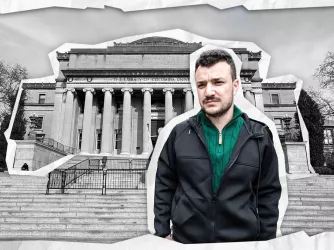Table of Contents
New York Civil Liberties Union questions Rensselaer Polytechnic Institute’s invocation of “non-existent” policies

In the wake of Rensselaer Polytechnic Institute’s repeated attempts to stifle student supporters of the “Save the Union” campaign, the New York Civil Liberties Union (NYCLU) has now weighed in with a letter of its own, sharing its “grave concerns about credible reports that the Institute has been violating its own policies on free expression and due process in a very serious and disingenuous manner.” RPI’s efforts have found it tearing down student flyers, fencing off a startlingly large portion of its campus to keep protesters out of view of a black-tie fundraiser, and charging a student with solicitation for sharing a letter, critical of the administration, in a dormitory building.
The NYCLU echoes many of the concerns FIRE has raised across three letters to the Institute, and particularly hones in on RPI’s repeated pattern of invoking tortured readings of its own policies in order to charge “Save The Union” advocates with frivolous offenses. For example, charges included those of trespassing and “solicitation” through the distribution of a letter in support of the “Save the Union” campaign, which RPI levied by way of its policy prohibiting students from “operating a business.” In our third letter to RPI, FIRE pointed out that the charges were inconsistent with RPI’s own policies.
While all of the charges appear to have now been dropped, RPI did so grudgingly, telling the students that they’re not being held responsible this time, but that RPI’s tortured reading of its policies is correct and must be followed in the future. For example:
After review of all information presented related to this incident, it has been determined that this will be resolved informally and that no further judicial process is necessary.
Though this matter is now resolved, it is important that you understand and comply with Institute policies, including the following:
[...]
2. Students and other guests must receive prior authorization from the Office of Student Living and Learning to post or distribute information in a residence hall.
As the NYCLU points out, RPI is apparently inventing policies at will:
We are concerned because (as seen in attached list of RPI Policies): 1) the alleged policy regarding prior authorization before distributing flyers in residence halls does not actually seem to exist and it also seems to be in violation of the Student Bill of Rights, which guarantees free expression. It is very worrisome that RPI would essentially make up a non-existent policy to try to chill free expression by students, and then resort to such absurdities as claiming it falls under the policy on Operating a Business; it appears that Michael Gardner and Bryan Johns may have been singled out in a retaliatory manner based on prior events; [and] the letters [...] warn that an apparently non-existent policy must be followed in the future chill free expression.
The NYCLU is right. The policy at issue is quite clearly concerned with preventing commercial solicitation or “fundraising activities,” not the distribution of a letter intended to advocate a particular view about campus affairs. By its very terms, the policy only requires permission to conduct fundraising efforts. If RPI’s definition of “solicit” includes criticizing the administration, then the explicit terms of the policy — “[n]o outside organization or person may solicit in residence halls or apartments” — would mean that nobody could talk about campus affairs at all, with or without administrators’ permission.
That obviously was not the point of the policy, yet RPI now seems to believe that it can punish students for distributing “information” in a dorm without permission.
RPI has repeatedly invoked policies that either do not exist or cannot reasonably be read to apply to critics of the Institute’s administration. Even in defending against criticism that RPI’s policies are so vague that they allow for inconsistent or arbitrary enforcement, RPI’s own attorney argued that no student could be “sanctioned for expressing an opinion, provided it is within the realm of civil discourse (e.g., not hate speech or threatening).” But RPI does not appear to have a policy requiring that speech be within the realm of “civil discourse” — a criterion that, if it were required under RPI policy, leaves administrators with nearly limitless discretion to penalize speech critical of, as here, RPI administrators.
RPI has a long history of responding to its critics (or campus controversies) by censoring them, drawing far greater attention to the criticism or controversy in the process. A good way for RPI to avoid the Streisand Effect would be to consider reforms of its policies so that they’re clear and consistent with the Institute’s purported commitment to freedom of expression.
Recent Articles
FIRE’s award-winning Newsdesk covers the free speech news you need to stay informed.

Trump administration’s reasons for detaining Mahmoud Khalil threaten free speech

VICTORY! 9th Circuit rules in favor of professor punished for criticizing college for lowering academic standards

Free speech advocates rally to support FIRE’s federal appeal to defend advocacy in public parks
